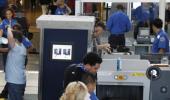When passengers book a flight, they could receive a secure 'journey pass' on their phone that stores all relevant travel information including passport data, seat assignment.

Airports may soon scrap traditional check-ins and boarding passes, replacing them with facial recognition and smartphone-based IDs, in what is shaping up to be the biggest overhaul in air travel in over 50 years.
The global aviation industry, led by the International Civil Aviation Organisation (ICAO), is laying the groundwork for a 'digital travel credential' that would allow passengers to move through airports using just their face and a mobile device.
If adopted widely, these changes could begin rolling out within two to three years, according to industry experts in the UK.
As reported by The Times, UK, this upgrade would mean that travellers no longer need to check in before flights or carry boarding passes.
Instead, when passengers book a flight, they could receive a secure 'journey pass' on their phone that stores all relevant travel information including passport data, seat assignment etc.
'This would be the biggest change in aviation in half a century,' Valerie Viale, director of product management at Amadeus, the world's largest travel technology provider, told The Times.
What This Could Mean for Travellers
If the system is fully realised, boarding passes, passport checks, and physical ID verification at multiple points would become redundant.
Facial recognition scanners at key touchpoints -- bag drop or pre-security gates -- would identify travellers and notify airlines of their arrival.
For those with only hand luggage, facial scans at the entrance to security could replace any physical check-in. For those with checked baggage, verification would happen at bag drop.
In both cases, passengers would not need to take out their passport or boarding pass.
As things stand today, travellers are required to check in online or at the airport, input passport details, and obtain a scannable boarding pass.
Under the new proposal, that process would vanish entirely, replaced by a constantly updating digital journey pass stored in a phone wallet.
More Than Convenience: A Smarter System
What sets this plan apart from previous updates is the dynamic nature of the digital credential. The journey pass wouldn't be static -- if your flight changes, gets delayed, or you're rebooked, the app would push a notification, and the journey pass would update automatically.
Amadeus emphasised privacy, saying facial scans would only match identity in real-time and not store data. Biometric details would be erased within 15 seconds of use at each touchpoint.











 © 2025
© 2025